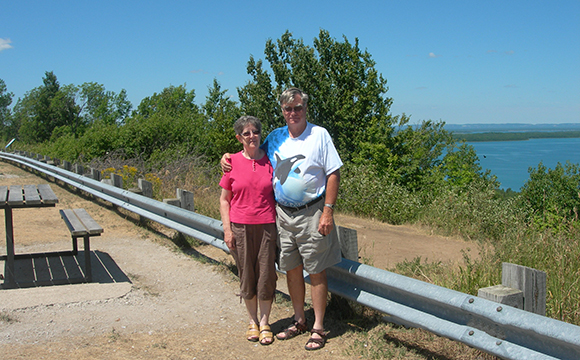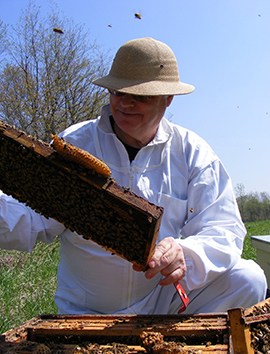Doug McRory
Doug was born in Kingston, Ontario, Canada.
Doug’s uncle and aunt kept about 12 beehives behind their two story stone house at Sydenham, Ontario. One bright, summer, Sunday afternoon, when Doug was about four years old, he was visiting with his parents, who were sitting with the family on the front porch of the sprawling Empire Loyalist farmhouse. Doug decided to investigate the little houses in the back yard. He decided that a hammer might be a useful tool. He soon was running as hard as his little legs would carry him screaming that “The little houses are biting me!!!” This was his first introduction to honey bees.
At fourteen Doug’s family moved to Owen Sound, Ontario where he completed public school. The Alliance church where they attended there had seven beekeepers also attending. This exposed Doug to an interest in honey bees.
The family then moved to Agincourt where Doug completed grade 12 of high school.
Doug’s dad was transferred back the Owen Sound with the Ministry of Highways for Ontario. Doug completed grade 13 at OSCVI. The real exposure to honey bees started in that year. Doug became a friend of Harold Bryans of Chatsworth Honey. Harold took Doug out the bees several times that summer. Jim, Doug’s brother worked that summer with Ross Howell another beekeeper and bought two bee hives in the spring which were set up on the hill behind the house on 7th Ave East, Owen Sound. Jim broke his arm doing the broad jump at school that spring and Doug was commandeered to look after the bees. That was a fantastic experience for the two brothers. They went through those colonies with a fine toothed comb every week all summer and learned a great deal by observation of these fascinating insects. They talked to every beekeeper in the district and became good friends with many of them. The two hives produced 360 pounds of honey for an impressive 180 pound average. Both boys were hooked on beekeeping!
The next summer Doug worked for Stanley Bryans who was Harold Bryan’s older brother. Stanley was 76 that year and had about 500 bee hives. These hives were in every size of equipment that had ever been invented in Ontario. They looked after the bees, extracted and packaged all of the honey so Stanley could go a do what he enjoyed the most – market honey. Stanley would load up his old station wagon and be gone for the day to peddle his product. Stanley had a large family and many descendants are still involved in the bee business. It was a great education to spend this time with this old time beekeeper.
Doug went off to University of Guelph and for two years while there ran Ross Howell’s Bee Farm in Flesherton, Ontario. Here Doug had many new experiences that moved along his knowledge of beekeeping. He produced 43 pounds of Royal Jelly, raised 500 queen bees, produced pollen and bulk honey which was marketed to Billy Bee Honey in Toronto where Doug met Jack Grossman, President of Billy Bee Honey. During this period Doug also made the equipment for 50 bee hives which he kept at Reg Garbut’s bee yards.
After two years at Guelph of general studies, students had to decide on a specialisation. Doug took Apiculture and Entomology. At that time Apiculture which had been established in 1894 as a department of the University was still a separate department with Gordon Townsend as chair, Dr. Reg Shuel and Dr. Morris Smith as professors, Phil Burke as Provincial Apiarist of Ontario and Al Adie as the beekeeper. This was an excellent time of emersion into all things beekeeping.
Doug was hired in April 1967 as Provincial Apiarist of Manitoba. He travelled by train to Manitoba and worked with Dave Smith and Andy Kolack the Provincial Entomolgists out of the Norquay Building in Winnipeg. In July of 1967 Doug returned to Owen Sound, Ontario to marry Norma Farrow. They returned to Winnipeg Manitoba where they lived until April 1971. Doug travelled to every corner of Manitoba and knew most beekeepers in the province. He was also able to travel to other provinces and to the USA for beekeeping meetings.
In 1971 Doug and Norma moved with their two children, Pam and Ken, to a bee farm in Benito, Manitoba that was 350 miles northwest of Winnipeg. They were in the country on a forty acre parcel of land with the Swan River flowing through. This was a major adjustment for Norma, the city girl, to adapt to farm life in rural Manitoba. She did great and the family developed many lifelong friends in the Swan River Valley area.
This was the era of package bees in western Canada. The business developed to 4200 colonies. 43 trips were made to pick up package bees in California. Many container and truck loads of beautiful white honey were produced and shipped to Mellona Honey in Holland, Billy Bee in Toronto and through Doug’s best friend in beekeeping Ed Podolsky to the United States. 45 barrels of pollen was taken each year to Bob and Bill Kohen in Glenn, California to feed to their honey bees. Many young people went to college with the money from their summer jobs at McRory Apiaries.
In October 1983 the McRory family moved back to Owen Sound, Ontario where Doug again worked for Ross Howell but this time as Real Estate Agent with Century 21.
On January 2, 1985 Doug began work with Ontario Ministry of Agriculture, Food and Rural Affairs as Provincial Apiarist (OMAFRA) where he worked until March 31, 2009. The family moved to Guelph in June of 1985 and has lived there since. The Honey Bee Tracheal Mites (HBTM) were found in Texas in 1984, so the first day at work in 1985 Doug was in a high level meeting with the Federal Deputy of Agriculture and many OMAFRA personnel to find a way to close the border with the USA for honey bee imports to eastern Canada. Mites have dominated the 24 years and 4 months of service as Provincial Apiarist of Ontario. Ontario has one of the best bee programs in North America and it is the result of the Ontario Beekeepers Association (OBA), OMAFRA Bee Program and University of Guelph Honey Bee Research Programs and now the Ontario Tech-Transfer Program working together that has led to this success. There were many interesting times along the way during this period. Most enjoyable was spending time with the many honey bee researchers that were brought to Ontario to speak. The many bee meetings attended all over North America amplified Doug’s knowledge of bees. Spending time and developing friendships with beekeepers all over Ontario was a great life experience. The Bee Inspectors of Ontario were just a great group of dedicated beekeepers who were passionate about their work. Doug got to travel every corner of this province where honey bees are kept. The Bee Program is strong and is being carried on under the direction of Paul Kozak.
Since retiring Doug has been busy – he was on a successful search committee for a pastor for his church, was on the board of Calvary Baptist Church and was elected to the Board of Directors of the OBA. He visits many older retired folks from his church. He has kept bees for the last ten years and, as he does not want to lug honey around, is focused on nuc production and pollination. Doug now has 400 bee hives in 25 bee yards. He is enjoying his bees and having time to visit with beekeepers and friends. He also loves to get out in his fishing boat with Norma who is quite the competitive fisherwoman!






